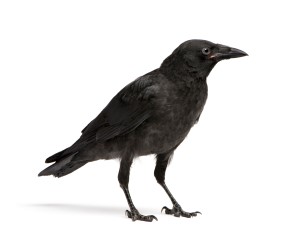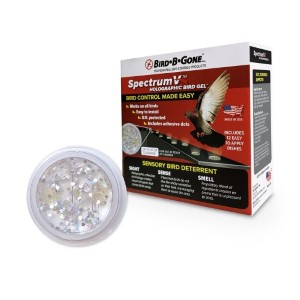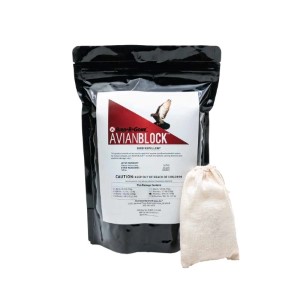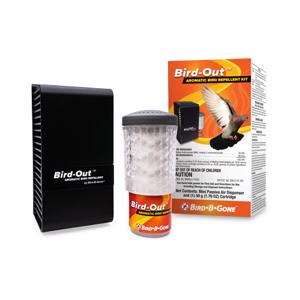Please add the schema tags below
How to Keep Crows Away in 2021 [Professional Tips & Tricks] - Bird B Gone, Inc.
Are crows the world’s smartest birds? We don’t know, but one thing’s certain: If you are trying keep crows away, you really need to be prepared. You might even need to wear a disguise.
Jokes aside, crows have adapted to living in urban environments and with that have brought along their droppings, nesting material and nuisance behavior.
The Problems Crows Bring
Crows are equal opportunity pests; they cause trouble everywhere they go.
- Cities. Crows use their sharp beaks to peck at the rubber seals on automobile sunroofs and wiper blades. They damage roofing tiles. They toss garbage around. True story: a crow was observed entering a garbage can, retrieving a tossed fast-food bag, turning the bag upside down to empty its content all over the ground, and then eating the refuse.
- Noise Pollution. Flocks of crows are noisy and leave toxic droppings in profusion.
- Agriculture. Crows will uproot developing corn seedlings. They wreak havoc on peanut, sorghum, sunflower, corn, and other crops. Their sharp beaks can even break open watermelon.
- Livestock. Crow droppings spread transmissible gastroenteritis (TGE) in swine facilities. Crows prey on small animals such as lambs and baby goats.
How to Keep Crows Away
Before we install any crow control products there are a few steps needed to prep the area.
1) Cleanup & Sanitize
The first step in any bird control program is cleaning up. Crows are attracted to the scent of their droppings and nesting materials; as long as evidence of infestation is present, the problem will continue. Talk to the experts at Bird B Gone about appropriate and safe methods for cleaning. If significant droppings are present, hiring a professional is strongly advised.
2) Remove Food and Water
The second step is to remove sources of food and water. Crows don’t necessarily roost where they feed and, to crows, pretty much everything is food, so this may not solve the problem, but it’s still a wise precaution.
- Remove bird feeders
- Feed pets indoors
- Cover compost bins
- Use closed trash bins that crows can’t easily access
- Bus tables quickly in outdoor dining areas
- Post signs that discourage bird feeding
- Treat lawns and crops for grubs, a favorite crow snack
Use Professional Crow Deterrents
Crows are savvy. They work as a team to watch for predators and other threats, so you’ll often see scouts up high. Using professional crow deterrent products in these high perching locations will help stop crows from inhabiting your property.
Products such as Bird Spikes, Bird Jolt Flat Track, Bird Spiders, or Repeller 360 successfully keep crows off roofs, ledges, lights, signs, AC units, and other lookout posts. You can also install nets to prevent crows from accessing their favorite viewpoints and nesting locations.
Scare Crows Away with Sound and Visuals
Crows are always on the alert for threats, so humane scaring and harassing tactics work well. Sound and visual crow deterrents work wonders, making them popular among the DIY community. If you have not tried any deterrents, sound and visual crow deterrents are a great place to start.
- Visual distractions such as SpectrumV Holographic Bird Gel, Flash Tape, or Reflect-a-Bird
- Recorded crow distress calls on the Bird Chase Super Sonic
- Loud noises (warn your neighbors)
- Lasers like the AVIX Lite Laser Bird Deterrent
Easy to Use Crow Repellents
Crow repellents are designed to humanely irritate birds enough to evade the area. These methods are used to safely push crows away from the property to more suitable locations to inhabit.
- Repellents that contain methyl anthranilate (Grape extract) such as Avian Block that irritate the crow’s eyes, nose, and throat without causing any harm
- Avian Block pouches can be discretely hung or tied down to areas such as outdoor dining, porches, entranceways, trees, gardens and more.
- Simply fasten or zip tie Avian Block and call it a day.
The Facts About Crows
The best way to quickly, humanely, and effectively deter crows is to understand their behavior and biology. Luckily, we’ve summarized the bulk of things and highlighted the most important facts.

Crow Biology
Let’s start with a bit of biology. Crows are members of the Corvidae family of birds. Specifically, they belong to the Corvus genus, a group that includes about 45 species of medium to large black birds that are all known as crows, ravens, or rooks. Birds in the Corvus genus all share a slender appearance, a small round head, a sharp conical beak, strong legs, and a wedge-shaped tail. Aside from minor color differences, size is the most distinct difference between species.
For example, common crows and ravens look very similar, but crows are smaller all around; without seeing them next to one another, it can be difficult to tell which is which. Groups of crows are collectively known as flocks or murders.
Diet: What do Crows Eat?
Crows are omnivores and will eat almost anything including fruits, nuts, seeds, mollusks, worms, small animals, eggs, scavenged carrion, and even other birds. Because their diet is so diverse, crows can live anywhere; you’ll find them in neighborhoods, cities, farms, fields, parks, orchards, forests, and more.
Behavior: Why So Many Crows?
As frustrating as crows can be, they are fascinating creatures and watching them is worth your time. While in every other situation, crows are noisy and obnoxious, when nesting, they are quiet and secretive. They typically nest from March to June. Both the male and female watch the nest and feed the young. Families stay together and often the young from the previous year assist with raising the new family members. Parents are highly protective of nests and their young and will defend them aggressively. In fall and winter, flocks numbering in the hundreds or thousands roost together in sites that they return to year after year. One such site in New York has been recording roosting crows for over 125 years. If one of these flocks is on or near your property, you’ve got trouble.
Most significantly, research show that crows are among the world’s smartest animals. Crows have been observed doing the following:
- Using tools
- Solving puzzles
- Saving food
- Playing games
- Giving gifts
- Counting
- Distinguishing similarities and differences
Alarmingly, crows also recognize humans. If one crow perceives you as a threat, they will remember your face for years and can even pick you out of a crowd for attack. If you think a crow is singling you out, you’re probably right. They’re also interminable gossips and they’ll tell all their friends and family about you, at which point this tightly knit community will work together to aggressively defend their territory from you.
Incredible smarts certainly makes crow control an especially vexing problem, but Bird B Gone has solutions.
Professional Help
The truth is, crows are a difficult problem. They are smart, they are aggressive, and they are hard to deter. They are also dangerous, so while they are protected by the Migratory Bird Act, there are exceptions. If you are struggling with a crow problem, contact the bird control experts at Bird B Gone. Our team has the skills and resources to get rid of crows on your property permanently. We are here to recommend solutions to clean up debris, Installation techniques and answer questions about humane crow control methods tailored for your property.
Call us today for help with all your nuisance bird challenges.

![How to Keep Crows Away in 2021 [Professional Tips & Tricks] - Bird B Gone, Inc. How to Keep Crows Away in 2021 [Professional Tips & Tricks] - Bird B Gone, Inc.](https://cdn11.bigcommerce.com/s-xj69ljw63/images/stencil/935x701/uploaded_images/crow-perched-on-the-roof-gutter-of-a-house.jpg?t=1619645088)



